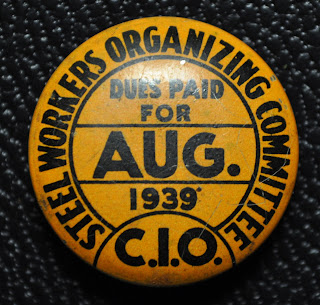Monday, November 11, 2013
Hormel Local P9 - Austin, MN

1933 strike
Frank Alexander Ellis was born on 10 September 1888, in St. Joseph, Missouri. He attended the Floyd School in St. Joseph. Ellis was involved in the organized labor movement during nearly all of his adult life. He worked for the Hormel Company of Austin, Minnesota, in the Hog Casing Department from November 1928 until July 1933. In 1933, Ellis helped organize the Independent Union of All Workers and conducted one of the nation's first successful sit-down strikes. He terminated his employment in 1933 in order to found and become the first president of Local P-9, United Packinghouse Workers of America. He became the vice-president of the United Packinghouse Workers in May 1937, a position he held until his retirement in 1952. Frank Ellis died in December of 1976.1985 strike
In August 1985, Hormel workers went on strike at the Hormel headquarters in Austin, Minnesota. In the early 1980s, recession impacted several meatpacking companies, decreasing demand and increasing competition which let smaller and less-efficient companies to go out of business. In an effort to keep plants from closing, many instituted wage cuts. Wilson Food Company declared bankruptcy in 1983, allowing them to cut wages from $10.69 to $6.50 and significantly reduce benefits. Hormel Foods had avoided such drastic action, but by 1985, pressure to stay competitive remained.[11]Workers had already labored under a wage freeze and dangerous working conditions, leading to many cases of repetitive strain injury. When management demanded a 23% wage cut from the workers they decided to begin the strike.[12] It became one of the longest strikes of the 1980s. The strike began with the sanction of the Local of the United Food and Commercial Workers International Union, P-9. The local chapter of the United Food and Commercial Workers Union P-9 led the strike, but was not supported by their parent union. The strike gained national attention and led to a widely publicized boycott of Hormel products.
After six months, a significant number of strikebreakers crossed the picket line, provoking riots in Austin. On January 21, 1986, the Governor of Minnesota, Rudy Perpich, called in the National Guard to protect the strikebreakers. This brought protests against the governor, and the National Guard withdrew from Austin. The action had a greater effect on the UFCW international, which ousted the local P-9.
The strike ended in June 1986, after lasting 10 months. Over 700 of the workers did not return to their jobs, refusing to cross the picket line. In solidarity with those workers, the boycott of Hormel products continued for some time. Ultimately, however, the company did succeed in hiring new workers at significantly lower wages.
The strike was chronicled in the film American Dream, which won the Academy Award for best documentary in 1990. A song about the strike, entitled "P-9" was written by Dave Pirner of the Minneapolis band Soul Asylum. The song can be found on their 1989 album, Clam Dip & Other Delights.
The strike has also had a Harvard Business School Case written based on it (with assumed names), called "Adam Baxter Co./Local 190" which features multiple rounds of negotiations between unions and management.[13]
http://en.wikipedia.org/wiki/Hormel
Saturday, June 29, 2013
Thursday, June 20, 2013
Saturday, June 15, 2013
Subscribe to:
Comments (Atom)
U7Hw~~60_57.JPG)










